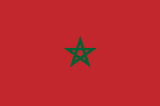CUSTOMS REGULATIONS
- Customers presence is not required for Customs clearance
- Used household goods and personal effects in reasonable quantities may be imported duty-free if owned for more than six months
- If two shipments are sent, the second shipment must arrive no later then six months after the first
- Shipments are physically inspected
DOCUMENTS REQUIRED
- Passport (original)
- Residence Visa (original)
- Work Permit or Work Certificate from the employer (original)
- Certificate of Residence Change (original) issued by the local authority at the point of departure
- Inventory (in French consularized)
- Letter signed by the Customer authorizing the Destination Agent to clear the shipment
Import or Transit of Plant Products
- Treatment of wood packaging materials: All wood packaging material arriving in Morocco must be stamped with the International Standard for Phytosanitary Measures (ISPM 15) mark, which guarantees it has been treated. Only wood packaging material stamped will be allowed to transit or be imported into Morocco.
- Products subject to phytosanitary inspection: Certain plant products are subject to a phytosanitary inspection at Moroccan customs by agents of the National Office for Food Safety (ONSSA):
- All plants or parts of plants and, in general, all plant debris;
Substrates for crops;
Corks, bark, tan, timber (logged, sawn and firewood), wood packaging material, etc.;
All products of vegetable origin such as dried fruits and vegetables, unground raw spices, flours, bran, cattle-cakes, straws and hays;
Any object or material used for the transportation or handling of plant products.
A phytosanitary import inspection certificate will be given to the importer or his agent, or sent by e-mail to customs, mentioning the decision taken following the inspection.
- Prohibition of certain plant products: Plant products such as soil, manure, compost, plant debris, etc., on which the health inspection has detected the presence of pests (insects, bacteria, invasive and parasitic plants, etc.), will be turned back or destroyed. Other types of plant products on which pests have been detected may, however, be accepted subject to treatment.
- Sending products that do not comply with these requirements will delay shipments and may result in additional charges.
MOTOR VEHICLES
- All vehicles and motorcycles must be officially approved by the Moroccan government
- All vehicles are highly dutiable
- Permission to circulate is granted for 3 months, beyond this point the Customer must pay Customs duty or export the vehicle
- Documents required:
-Import License
-Original car license
-Passport
-Auto Paperwork
-Invoice
- As of 01-20-2011, second hand vehicles older than five years may not be imported into Morocco.
- For second hand vehicles older than five years, a temporary admission period of six months is still possible.
-Customer will have to export the vehicle from Morocco within the six month period.
-This procedure does not apply to diplomats with ‘diplomatic corps’ status.
PETS
- Health Certificate, dated not more than 14 days before departure, is required
DUTIABLE/RESTRICTED ITEMS
- New items less then six months old (Commercial Invoice required)
- Food and beverages
- Electronic and electrical items are dutiable (load near container door for easy access)
- Antiques
- Portable phones must be approved by the Ministry of P.T.T.
- Medicine (permit from Ministry of Health required)
- Weapons and ammunition (hunting permit and firearm acquisition certificate required). Only smooth-barreled hunting weapons are permitted.
- Books, records and cassettes and compact disks
- A list must be provided stating the title and name of author for each item
- These items will be viewed by the Ministry of Information before a censorship visa is granted. Place any dutiable/restricted items near container doors for easy access.
PROHIBITED ITEMS
- Moroccan currency
- Pornographic and politically sensitive material
- Narcotics and drugs
- Walkie-talkies
- Alcoholic beverages and tobacco products
- Explosives